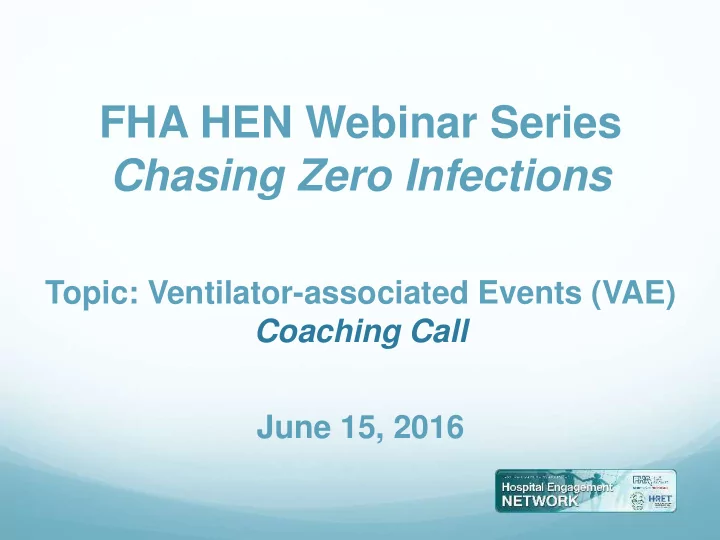

FHA HEN Webinar Series Chasing Zero Infections Topic: Ventilator-associated Events (VAE) Coaching Call June 15, 2016
Agenda Welcome and HEN Update Sally Forsberg, RN, Director of Quality & Patient Safety, Florida Hospital Association VAE Coaching Call: Polling Questions & Discussion Points - Linda Greene, RN, MPS, CIC, Infection Prevention Manager, Highland Hospital, Rochester, NY Chasing Zero Infections - Next Call
HEN Update FHA HEN In-person Meetings (Save the Dates!) Sept. 1 – OB Hot Topics Meeting, FHA Orlando Office Sept. 15-16 – FHA HEN Summit: Tying it Together, The Westin Lake Mary
HEN Update Other Upcoming Webinars June 23 – VAE Webinar: Families Make a Difference (HRET) June 28 – Best Practices in LGBT-Patient Centered Care for Hospitals (FHA HEN) June 30 – C. diff Webinar (HRET) July 6 – QI Office Hours: Sepsis Project Focus (HRET) July 12 – CAUTI Webinar (HRET) July 21 – SSI Webinar (HRET) July 26 – Sepsis Webinar (HRET) August 2 – VAE Webinar (HRET) August 9 – CAUTI Webinar (HRET)
HEN Update Weekly Email: HEN Upcoming Events FHA and HRET webinars and meetings on various HEN topics HRET HEN Web site > Upcoming Events: www.hret-hen.org FHA HEN Chasing Zero Infections Series Content Webinars - Didactic Learning Coaching Calls - Interactive Discussion Hospital Coaching Call - one-on-one coaching with a hospital
Polling Question Have you accessed the Toolkits or Change Packages on the HRET Website? 1. Yes 2. No 3. I’ve never been to the HRET Website
Chasing Zero Infections Series Coaching Calls Webinars (1-2 pm ET) (1-2 pm ET) March 30- CAUTI Jan 28 – CAUTI April 5 - SSI Feb 25 – SSI May 5 - CLABSI April 28 - C. difficile June 15 - VAE June 23 - CLABSI July 28 – SSI Colon Aug 4 - Sepsis Surgery Aug 30 – CAUTI & Sept 14 – Sustaining CLABSI the Gains: HAIs Recordings are available – email HEN@fha.org
Ventilator-associated Events (VAE) Polling Questions & Discussion Points Linda Greene, RN, MPS, CIC Infection Prevention Manager Highland Hospital Rochester, NY
Coaching Call VAE
Polling Question- VAE What is your role related to VAE? 1. Infection Prevention 2. Respiratory Therapy 3. Nurse manager or leader 4. Project champion 5. Quality/ Patient Safety 6. Other
Why Collect VAE Data ? Infection Prevention efforts may fail due to silo mentality Need to view interventions under the larger context of patient safety Connect the dots to harm
Possible and Probable VAP are combined (PVAP) Provides simplification Consistent with original plan for analysis (PoVAP and PrVAP combined as 1 event )
Daily minimum PEEP and FiO2 When there is no value documented to have been maintained for at least 1 hour, the daily minimum value is the lowest value set on the ventilator during the calendar day. Examples where exception may apply: Ventilator support is initiated late in the calendar day Ventilator support is removed early in the calendar day Ventilator settings are changed frequently throughout the calendar day such that no setting is maintained for > 1 hour
New Denominator Optional Field (Episodes of Mechanical Ventilation) Total number of episodes occurring during a month Evidence based practices focus on getting the patient off the ventilator First step in exploring other denominators Still require ventilator days and APRV days
Polling Question- VAE Do you collect VAE data? 1. Yes 2. No, but planning on it 3. No
Polling Question- VAE Do you use your VAE data to drive improvement? 1. Yes 2. No
Discussion points
Polling Question- VAE What is your biggest barrier to collecting and analyzing VAE data? 1. Lack of stakeholder buy-in 2. Question of preventability 3. Lack of understanding 4. Confusion with definition
Discussion points
Challenges I don’t think VAE is preventable No benchmark VAE has data nothing to do with IP Where’s the evidence? What about We have zero known VAP- This is prevention not fair! practices? My patient was admitted with pneumonia already
Polling Question- VAE Do you do SBTs and SATs? 1. Yes 2. No
Discussion Points
Polling Question- VAE Do you have a formal progressive mobility protocol? 1. Yes 2. No
Importance of Nurse-led Mobilization Most ICU nurses know why Early Mobility in the ICU is critically important Need to do a gap analysis of barriers and address each through education, training, policies, equipment, communication Barriers found upon Beaumont survey: Safety is a high concern Risk of injury to patient and self Accurately dosing mobility, choosing equipment, and communicating
Discussion Points
Problems Associated with Critical Illness When deconditioning and muscle weakness occur the course becomes complicated, the stay in the ICU is prolonged, and mortality increases Risk developing ICU-associated weakness due to polyneuropathy, myopathy, or a combination of both The cumulative effect of the complications are functional limitations that might or might not resolve.
Potential body/structure effects of critical illness Nordon-Craft A, Moss M, Quan D, Schenkman M: Intensive care unit-acquired weakness: Implication for physical therapist management. Phys Ther. 2012; 92:1494- 1506.
What Are Your Barriers?
Discussion and Questions
Chasing Zero Infections-Next Call Chasing Zero Infections Webinar (Didactic Learning) Topic: CLABSI June 23, 2016 1-2 pm ET Register: https://cc.readytalk.com/r/rumyf7w7rrvg&eom
Evaluation Survey & Continuing Nursing Education • Eligibility for Nursing CEU requires submission of an evaluation survey for each participant requesting continuing education: https://www.surveymonkey.com/r/chasezero061516 • Share this link with all of your participants if viewing today’s webinar as a group. • Be sure to include your contact information and Florida nursing license number. • FHA will report 1.0 credit hour to CE Broker and a certificate will be sent via e-mail.
Contacts Sally Forsberg, RN, MBA, NEA- BC, CPHQ Director of Quality & Patient Safety Florida Hospital Association sally@fha.org or 407-841-6230 Linda R. Greene, RN,MPS,CIC Manager of Infection Prevention UR Highland Hospital, Rochester, NY linda_greene@urmc.rochester.edu
Recommend
More recommend